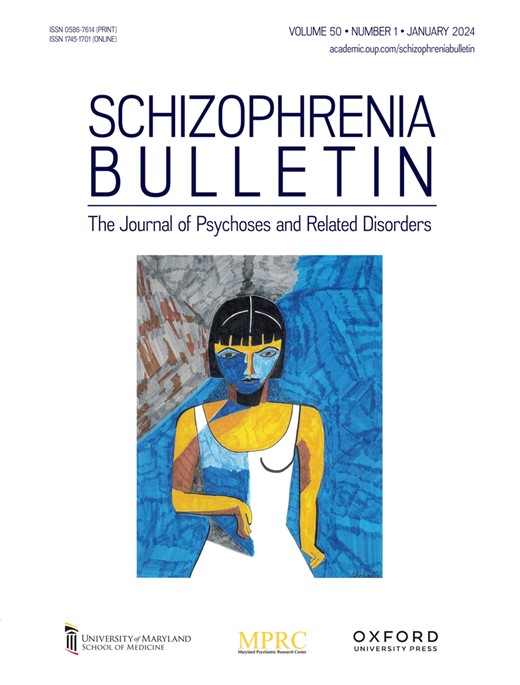Severe Outcomes and Length of Stay Among People With Schizophrenia Hospitalized for COVID-19: A Population-Based Retrospective Cohort Study
IF 5.3
1区 医学
Q1 PSYCHIATRY
引用次数: 0
Abstract
Background Schizophrenia is associated with substantial physical and psychiatric comorbidities that increase the risk of severe outcomes in COVID-19 infection. However, few studies have examined the differences in care and outcomes among people with schizophrenia throughout the pandemic. We hypothesized that rates of in-hospital mortality, admission to the intensive care unit (ICU), and length of stay differed among people with and without schizophrenia. Study design We conducted a population-based retrospective cohort study using administrative health data from Ontario, Canada, which included individuals hospitalized for COVID-19 between February 2020 and October 2023. We compared mortality, ICU admission, and length of stay using regression models adjusted for age, sex, comorbidities, vaccination status, and sociodemographic characteristics. Study results We evaluated 66 959 hospital admissions, 4.3% (2884) of which involved people with schizophrenia. People with schizophrenia had a significantly decreased rate of ICU admission (adjusted Odds Ratio [OR]: 0.74 [0.67, 0.82]), a longer length of stay (adjusted RR: 1.25 [1.21, 1.30]), but a similar risk of mortality (adjusted OR: 1.09 [0.98, 1.22]) as people without schizophrenia. Age modified the relationship between schizophrenia and ICU admission. People with schizophrenia aged 60-75 were substantially less likely to be admitted to the ICU relative to those without (18.4% vs 26.5%, P < .001). Conclusions Our findings underscore disparities in care among people with and without schizophrenia. These disparities vary by age and suggest that people with schizophrenia may not be receiving the same level of care as people without schizophrenia hospitalized for COVID-19.因COVID-19住院的精神分裂症患者的严重结局和住院时间:一项基于人群的回顾性队列研究
精神分裂症与大量身体和精神合并症相关,这些合并症增加了COVID-19感染严重后果的风险。然而,很少有研究调查了在大流行期间精神分裂症患者在护理和结局方面的差异。我们假设精神分裂症患者和非精神分裂症患者的住院死亡率、重症监护病房(ICU)入院率和住院时间存在差异。研究设计我们使用加拿大安大略省的行政卫生数据进行了一项基于人群的回顾性队列研究,其中包括2020年2月至2023年10月期间因COVID-19住院的个体。我们使用年龄、性别、合并症、疫苗接种状况和社会人口学特征调整的回归模型比较了死亡率、ICU入院和住院时间。研究结果:我们评估了66 959例住院患者,其中4.3%(2884例)涉及精神分裂症患者。精神分裂症患者的ICU住院率显著降低(校正优势比[OR]: 0.74[0.67, 0.82]),住院时间较长(校正风险比:1.25[1.21,1.30]),但死亡风险与非精神分裂症患者相似(校正风险比:1.09[0.98,1.22])。年龄改变了精神分裂症与ICU住院的关系。60-75岁精神分裂症患者入院ICU的可能性明显低于非精神分裂症患者(18.4% vs 26.5%, P <;措施)。结论:我们的研究结果强调了精神分裂症患者和非精神分裂症患者在护理方面的差异。这些差异因年龄而异,表明精神分裂症患者可能没有获得与因COVID-19住院的非精神分裂症患者相同的护理水平。
本文章由计算机程序翻译,如有差异,请以英文原文为准。
求助全文
约1分钟内获得全文
求助全文
来源期刊

Schizophrenia Bulletin
医学-精神病学
CiteScore
11.40
自引率
6.10%
发文量
163
审稿时长
4-8 weeks
期刊介绍:
Schizophrenia Bulletin seeks to review recent developments and empirically based hypotheses regarding the etiology and treatment of schizophrenia. We view the field as broad and deep, and will publish new knowledge ranging from the molecular basis to social and cultural factors. We will give new emphasis to translational reports which simultaneously highlight basic neurobiological mechanisms and clinical manifestations. Some of the Bulletin content is invited as special features or manuscripts organized as a theme by special guest editors. Most pages of the Bulletin are devoted to unsolicited manuscripts of high quality that report original data or where we can provide a special venue for a major study or workshop report. Supplement issues are sometimes provided for manuscripts reporting from a recent conference.
 求助内容:
求助内容: 应助结果提醒方式:
应助结果提醒方式:


